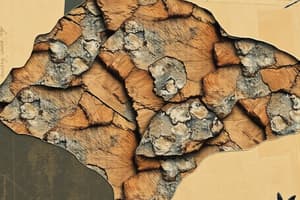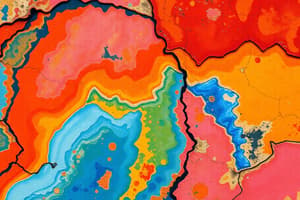Podcast
Questions and Answers
What is the primary process responsible for the breaking down of rocks into smaller fragments?
What is the primary process responsible for the breaking down of rocks into smaller fragments?
- Sedimentation
- Metamorphism
- Weathering (correct)
- Erosion
Which type of weathering involves the formation of new compounds through chemical reactions?
Which type of weathering involves the formation of new compounds through chemical reactions?
- Biological Weathering
- Physical Weathering
- Chemical Weathering (correct)
- Frost Weathering
What natural process is defined as the downslope movement of rocks due to gravity?
What natural process is defined as the downslope movement of rocks due to gravity?
- Erosion
- Mass Wasting (correct)
- Weathering
- Sedimentation
Which process involves oxygen reacting with iron in rocks, leading to rust formation?
Which process involves oxygen reacting with iron in rocks, leading to rust formation?
What role does weathering play in soil formation?
What role does weathering play in soil formation?
Frost weathering primarily occurs through which of the following mechanisms?
Frost weathering primarily occurs through which of the following mechanisms?
The alternate freezing and thawing of water primarily leads to what kind of weathering?
The alternate freezing and thawing of water primarily leads to what kind of weathering?
Which of the following statements is true regarding biological weathering?
Which of the following statements is true regarding biological weathering?
What process results in the enlargement of rocks and the removal of lime?
What process results in the enlargement of rocks and the removal of lime?
Which type of erosion involves the removal of soil by the concentration of running water?
Which type of erosion involves the removal of soil by the concentration of running water?
Which type of erosion occurs when winds carry large amounts of fine soil particles?
Which type of erosion occurs when winds carry large amounts of fine soil particles?
What is the process in which rocks are directly dissolved in water called?
What is the process in which rocks are directly dissolved in water called?
What is the primary concept of the Big Bang Theory?
What is the primary concept of the Big Bang Theory?
What theory suggests that the universe has cycles of expansion and contraction?
What theory suggests that the universe has cycles of expansion and contraction?
Which term describes the removal of thin layers of soil due to surface runoff and rain?
Which term describes the removal of thin layers of soil due to surface runoff and rain?
What is the result of primordial heat within the Earth?
What is the result of primordial heat within the Earth?
Which model posits that the Sun is at the center of our solar system?
Which model posits that the Sun is at the center of our solar system?
Who proposed the Steady-State Theory?
Who proposed the Steady-State Theory?
Which geological structure is characterized by dipping downwards and forming a hill?
Which geological structure is characterized by dipping downwards and forming a hill?
The Nebular Hypothesis relates to the origin of which cosmic structure?
The Nebular Hypothesis relates to the origin of which cosmic structure?
What type of erosion is primarily driven by the flow of water in drainage lines?
What type of erosion is primarily driven by the flow of water in drainage lines?
What is Cosmology primarily concerned with?
What is Cosmology primarily concerned with?
Which astronomer is associated with the idea that the universe is expanding?
Which astronomer is associated with the idea that the universe is expanding?
What assertion does the Geocentric Model make about the solar system?
What assertion does the Geocentric Model make about the solar system?
What is the primary composition of the lithosphere?
What is the primary composition of the lithosphere?
Which feature is essential for Earth to maintain a suitable temperature?
Which feature is essential for Earth to maintain a suitable temperature?
Which planet is Earth often compared to due to similar size and structure?
Which planet is Earth often compared to due to similar size and structure?
What percentage of Earth's surface is covered by oceans?
What percentage of Earth's surface is covered by oceans?
Which property describes the 'streak' of a mineral?
Which property describes the 'streak' of a mineral?
Which gas layers comprise the atmosphere above the Earth?
Which gas layers comprise the atmosphere above the Earth?
What is a characteristic of homogeneous solids?
What is a characteristic of homogeneous solids?
What does the Mohs hardness scale measure?
What does the Mohs hardness scale measure?
What is erupted during a volcanic eruption?
What is erupted during a volcanic eruption?
What does the Richter scale measure?
What does the Richter scale measure?
Which scale assesses the intensity of shaking at a specific location during an earthquake?
Which scale assesses the intensity of shaking at a specific location during an earthquake?
Tsunamis are primarily caused by which geological event?
Tsunamis are primarily caused by which geological event?
What term is used to describe storms that originate over tropical oceans?
What term is used to describe storms that originate over tropical oceans?
Which type of cyclone forms in the Northwestern part of the Pacific Ocean?
Which type of cyclone forms in the Northwestern part of the Pacific Ocean?
What is the primary characteristic of a hydrometeorological hazard?
What is the primary characteristic of a hydrometeorological hazard?
What can help reduce the negative effects of natural hazards?
What can help reduce the negative effects of natural hazards?
Flashcards are hidden until you start studying
Study Notes
Weathering
- The process of breaking down rocks into smaller fragments called sediments.
- Plays a crucial role in soil formation.
- Soil consists of a mixture of grains, organic matter, water, and gas.
Chemical Weathering
- The weakening or disintegration of rocks through chemical reactions.
- Results in the formation of new compounds.
Oxidation
- Oxygen reacts with rocks, particularly those containing iron.
- Iron reacts with oxygen to form rust, which weakens the rocks.
Carbonation
- The process of forming carbonates in rocks.
- Results in the enlargement of rocks and removal of lime, which holds particles together.
Hydration
- The absorption of water by rocks, leading to a change in shape.
- Water absorption increases the volume of the rock, altering its grain structure.
Solution
- Minerals in rocks dissolve in water.
- This weakens, deforms, and breaks rocks over time.
Biological Weathering
- The disintegration of rocks caused by living organisms.
Mass Wasting
- The downhill movement of rock fragments due to gravity.
- A natural process that often occurs after weathering.
- Can be classified based on moisture and speed.
- A natural hazard that can cause significant damage.
Erosion
- The transportation of rock fragments by various agents.
Soil erosion
- The removal of soil at a faster rate than its natural replenishment.
Wind erosion
- Occurs when strong winds carry fine soil particles, spreading them and reducing soil fertility.
Sheet erosion
- The removal of thin layers of soil by surface runoff and rain.
Rill erosion
- The removal of soil by concentrated running water, forming small channels.
Gully erosion
- The removal of soil in large channels or drainage lines, creating deep gullies.
Endogenic Processes
- Processes that occur within the Earth's crust.
- Driven by heat and pressure from the Earth's interior.
- These processes form mountains, volcanoes, and earthquakes.
Exogenic Processes
- Processes that occur on or near the Earth's surface.
- Primarily driven by external forces like solar energy, gravity, and wind.
- These processes include weathering, erosion, and transportation of sediments.
Sources of Heat In Our Planet
- Primordial Heat: Internal heat energy accumulated during the Earth's formation billions of years ago.
Formation of the Universe
-
Big Bang Theory: The prevailing model explaining the origin of the universe.
-
The universe originated from an infinitely small and dense point around 13-14 billion years ago and has been expanding ever since.
-
Pulsating Theory (Oscillating Universe Theory): Argues that the universe undergoes cycles of expansion (Big Bang) and contraction (Big Crunch).
-
After a Big Crunch, a new Big Bang would restart the cycle.
-
Steady-State Theory: Proposes that the universe is constantly expanding and new matter is continuously being created to maintain a constant density.
-
Nebular Hypothesis: Explains the formation of the solar system from a rotating cloud of gas and dust called a nebula.
The Earth’s Subsystems
- Atmosphere: The gaseous layer surrounding the Earth.
- Biosphere: All living organisms on Earth.
- Hydrosphere: The water portion of the Earth (oceans, lakes, rivers, etc.).
- Lithosphere: The Earth’s rigid outer layer, composed of the crust and upper mantle.
What Makes Earth Habitable?
- The right distance from the sun.
- The Earth’s magnetic field protects it from harmful solar radiation.
- An insulating atmosphere keeps the Earth warm.
- The right amounts of water and carbon are present.
Earth’s Uniqueness
- It has liquid water on its surface.
- It has an atmosphere that protects it from harmful sun rays.
- It has a lithosphere made up of the crust and upper mantle.
Geological Time Scale
- Epoch: A subdivision of geological time longer than an age and shorter than a period.
- Period: A unit of geological time characterized by a particular rock series
Volcanic Eruption
- The release of gases, liquids, and solids from a volcano's vent.
Earthquakes
- Sudden movements or vibrations in the Earth's crust caused by the release of energy in rocks.
Magnitude
- A measure of the size of an earthquake at its source.
- Measured using the Richter Scale.
Intensity
- A measure of the amount of shaking felt at a specific location during an earthquake.
- Measured using the Mercalli Scale.
Tsunamis
- Enormous waves generated by seabed disturbances, such as earthquakes and undersea landslides.
Tropical Cyclones
- Cyclonic storms that originate over tropical oceans.
Cyclones
- Storms that form in the Indian Ocean and the Southwest Pacific.
Typhoons
- Storms that form in the Northwestern Pacific Ocean, including the Philippines.
Studying That Suits You
Use AI to generate personalized quizzes and flashcards to suit your learning preferences.




